Negativity is something that everyone experiences at some point in their lives, and honestly, it’s not usually that big of a deal. But if you are constantly feeling negative, even when your life is more or less in a good place, that’s cause for concern.
Do you find yourself not being able to focus on your work, no matter how hard you may try to? Do you find yourself avoiding your relationships and responsibilities because you are not able to get out of that loop of constant negativity in your mind? And most importantly, do you feel miserable and gloomy most of the time?
If you answered yes to all these questions, then chances are your mind is getting stuck on certain mental filters or negative thinking patterns that are feeding your negative thoughts, and pushing you towards depression.
Read 10 Habits That Cause Low Self Esteem And Depression
But don’t worry, as all is not lost! The best way to get out of these negative thinking patterns is by understanding what is exactly happening in your mind. The more you understand what you are going through, the better you will be able to deal with them.
Here Are 8 Common Thinking Patterns or Mental Filters That Feed Negativity and Depression
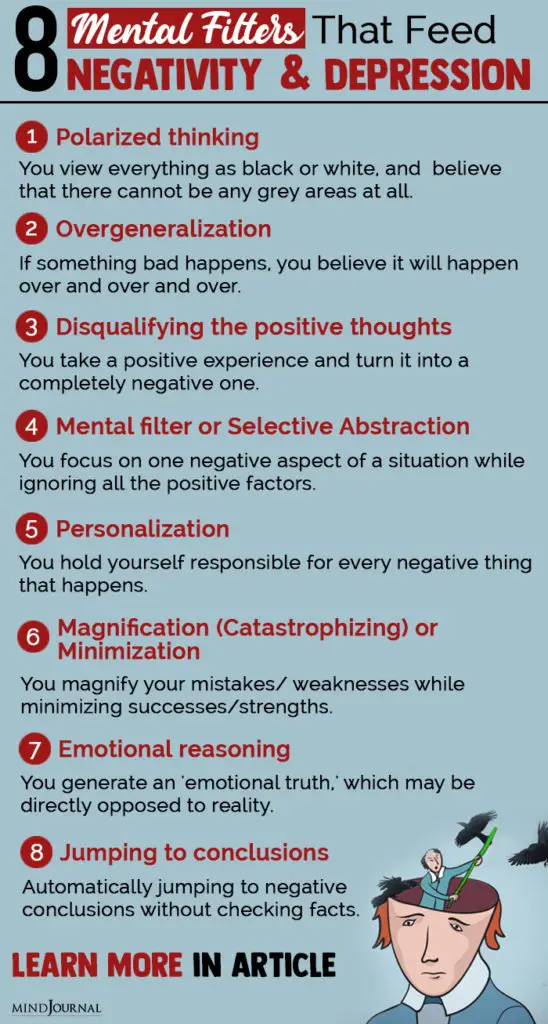
1. Polarized Thinking
In this type of thinking you view your interactions or yourself as either black and white, and you believe that there cannot be any grey areas at all. If something isn’t perfect, you consider it to be a failure. You believe that your life is either good and worthwhile to live, or it is completely miserable and worthless, with no in-between.
The majority of the time you believe that you must be perfect and then only you can have a better and happy life.
For example, in case you make any kind of mistake, no matter how minor, it makes you feel like a failure. This leads to you feeling more depressed than usual, and you keep on berating yourself emotionally. Moreover, you keep on feeling hopeless and worthless.
2. Overgeneralization
Another negative thinking pattern is overgeneralization. This happens when you take a single experience and consider it to be the universal truth.
For instance, you might have gotten your heart broken in the past, and now you see love and relationships in an entirely negative light. You think that just because your ex broke your heart, everybody else will. So there’s no point in being in a relationship, as it will always end badly.
This leads to you feeling lonelier, and you are unable to communicate with others because your inner thoughts are constantly battling amongst themselves.
Read How You Deal With Depression, According To Your Zodiac Sign
3. Disqualifying the Positive
Those who disqualify the positive thoughts experience this negative thinking pattern, similar to mental filtering. You tend to treat positive events as flukes and choose to hang on to a more negative mindset. It’s like you think that you are just not capable of doing something good.
This is also an extreme form of polarised thinking in which you ignore all your positives and focus solely on the negatives. This cognitive distortion will automatically result in thoughts that affirm negative feelings while explaining positive ones away.
Since you ignore positive experiences, you frequently feel inadequate or unappreciated.
For instance, suppose you performed well on stage but at the back of your mind you kept thinking how you could have been better.
Read 11 Warning Signs of Depression Relapse
4. Mental Filter
Have you ever heard of the expression that “people see their glass as half empty rather than half full?” This is a kind of negative thinking called “Mental Filter.” It is a type of cognitive distortion that frequently leads to increased levels of depression.
Those who have this type of negative thinking pattern will only see the negative aspects of their life, even if there are plenty of positive things to be grateful for. You will simply filter out all the positive parts of your life and only focus on the negative ones.
For instance, as a couple, if you are fighting and you tend to think about how terrible your partner is. You blame them for not being as they were before. You pick out their negatives and filter all the positive aspects about them.
Read How Cognitive Distortions Harm Us
5. Personalization
Personalization is one of the biggest factors that can lead to depression. It’s when you hold yourself responsible for every negative thing that happens (even if it’s not related to you at all), it’s known as personalization. You keep on blaming yourself for things that you didn’t do and are not responsible for.
Another example, you as a student believe that all hypothetical examples given by your college professor have been purposely directed towards you.
It is quite common among adults as well as children who believe that they have either been ignored and attacked.
6. Magnification (Catastrophizing) or Minimization
Magnification or Minimization refers to the cognitive distortion that involves perceiving the good outcomes of your actions as smaller than they are and the bad outcomes as larger than they are.
Sometimes you tend to amplify (magnify) the positive traits of others while reducing (minimising) your achievements and contributions, leading to depressive thoughts, anxiety or stress.
For instance, you are hoping to get good grades but you end up getting average results. You will see yourself as a total failure (magnification; exaggerate the negative).
Another instance, when you get good grades but believe that it was by fluke and it doesn’t mean you are actually smart (minimization; understatement of the positive).
7. Emotional Reasoning
Emotional reasoning is when an individual determines that their emotional reaction proves something is true without any proof. Emotional reasoning generates an ‘emotional truth,’ which may be directly opposed to reality.
For instance, you believe that your spouse is cheating on you based on your own assumptions. You are unable to express your thoughts to them and reason with yourself that your emotions are right. Therefore, you jump to conclusions and make hasty decisions.
This inability to be positive about oneself and the emergence of negative ideas are the underlying causes of depression.
Read The 10 Basic Do’s And Don’ts Of Depression
8. Jumping to Conclusions
The problem with this form of cognitive distortion is that it almost always has a negative outcome. You probably think this way, because you might have had a traumatic experience in your past, or have had several negative experiences, which has made you pessimistic and distrusting. You jump to negative conclusions, without having sufficient information, and then beat yourself up by telling yourself that everything is your fault.
For instance, you come to the conclusion that your teacher doesn’t like you or thinks badly of you because of the way she looks at you.
Trauma frequently leads to depression, therefore, to protect yourself in the future, you tend to picture the worst-case scenarios in every incident. This is because you do not want to be caught off guard again.
Steps on How to Change Negative Thinking Patterns
With appropriate help and guidance, you will be able to tackle these negative thinking patterns and deal with your depression and self-deprecating thoughts. Here are some measures you should take to help improve negative thinking patterns:
Determine the thoughts that trouble you.
The first step in identifying what is triggering your depression or anxiety is to determine what type of negative thinking is taking place. If you wish to learn more about how to gain a better understanding of how your thoughts influence your emotions and actions.
Negative thoughts usually have the following characteristics:
These are automatic thoughts, which means they will come to you without much thought.
- They can be distorted, which means they are not always incorrect, but they are also not based on facts.
- They can be harmful, as it influences how you feel and behave, making negative thoughts difficult to get out of your head.
- They are usually believable, you will accept them as facts and will not question them.
- They can be intrusive, which means that the thoughts can become disturbing over time and lead to depression or anxiety disorders
There are various forms of help you can receive from articles, videos or online webinars. Try to read books by experts like Dr David Clark on how to overcome negative thoughts.
Read 13 Signs You Have Negative Energy and How To Get Rid Of It
Cognitive behavioural therapy (CBT)
Cognitive behavioural therapy (CBT) is a well-known type of talk therapy in which patients learn to recognise and change their negative thoughts and behaviors. This form of psychological treatment may be beneficial for problems with depression or anxiety.
According to the American Psychological Association, CBT helps to detect and alter negative thinking patterns. It often focuses on helping the patient reach a specific goal. The therapy takes place across several sessions where you will be motivated so that your confidence boosts.
Read What Is CBT And How Does It Work?
How does CBT help?
During CBT session, a person facing issues with mental filters or depression can be benefited in the following ways:
- It helps you to gain clarity over the problem you’re facing
- Allowing you to develop a positive way of thinking
- Clarifying the wrong judgements or assumptions that you take
- Understanding how trauma works and keeping you motivated for your future experiences
- Seeing situations from a neutral perspective
With the proper guidance and medications, you will experience positive results anywhere from a few weeks to a few months.
- Conduct a self-evaluation.
More than 16 million American adults each year battle with depression, and one of the major underlying reasons for that is negative thinking patterns.
CBT can be quite expensive and not as affordable for many people. If you are finding it difficult to afford CBT, you can try out self-analysis.
People tend to repeat practises that have helped them deal with negativity and negative thoughts in the past. Exploring what has helped you before can help you deal with your struggles better. Weigh the benefits and drawbacks of your thoughts or habits, and make sure you utilize this self-evaluation to adjust your negative thoughts.
- Practice Self-love
Negative thinking patterns can cause you to become quite critical about yourself. Your internal thoughts can be quite harsh and end up having a detrimental effect on your mental health. Don’t think that you are alone in this, and consider speaking to a close friend or a family member who you trust.
If you are not comfortable sharing your feelings, write down your thoughts. You can maintain a journal to practise writing down what you are grateful for in your life, and what are the positive aspects of your life. Read them, and try to utilise the positive parts of your life in a self-loving way.
Read How I Use CBT When I Am Feeling Depressed
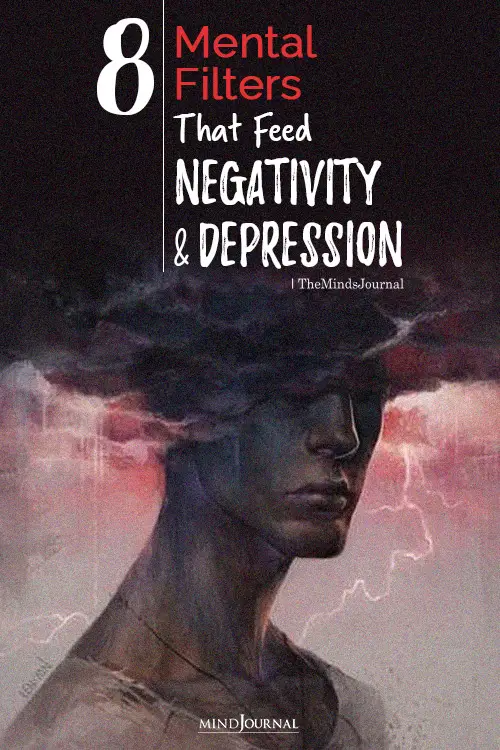
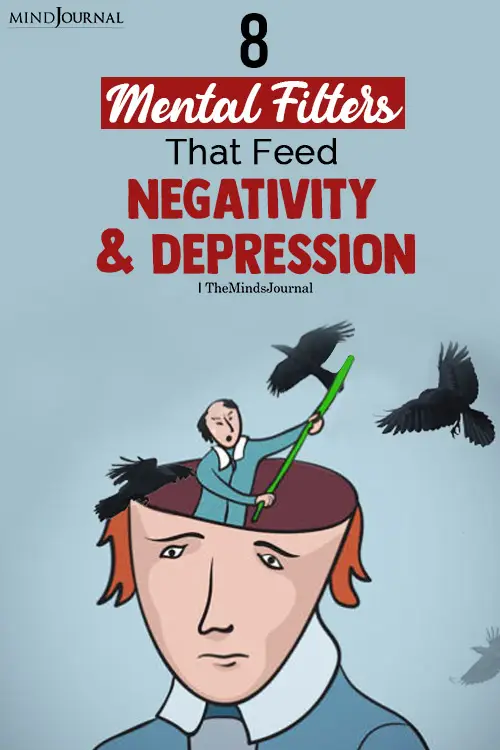
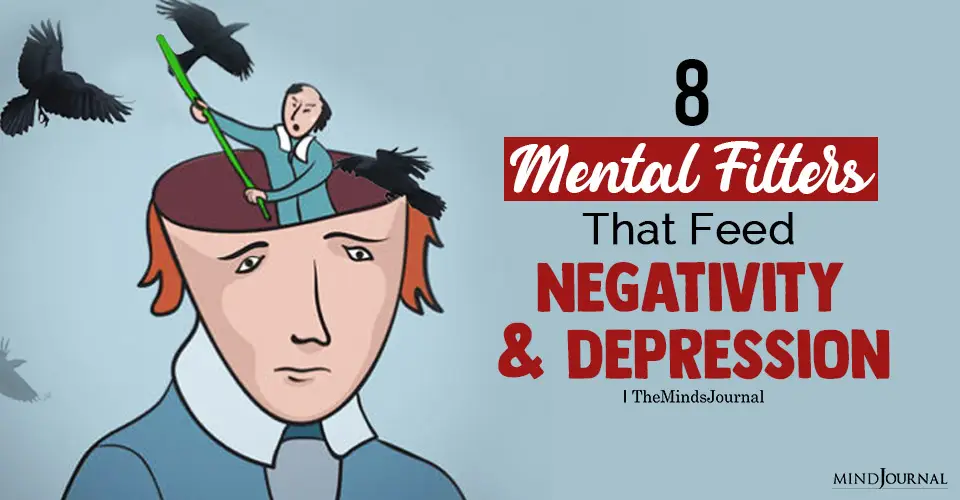
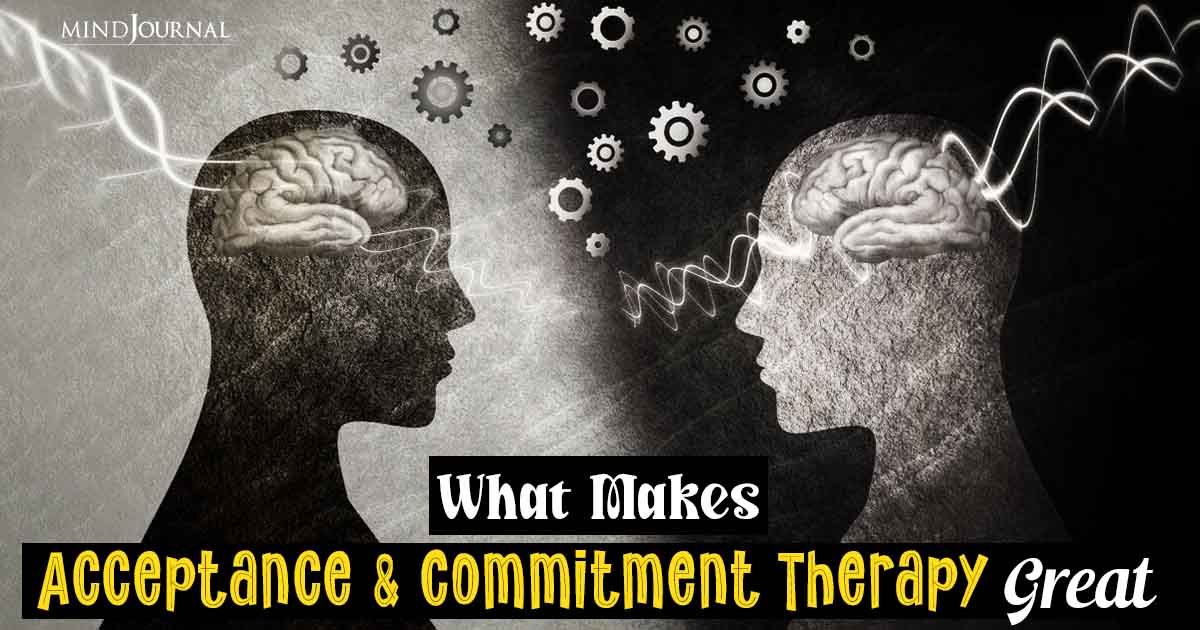






Leave a Reply
You must be logged in to post a comment.